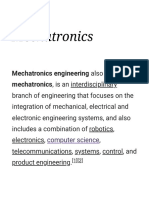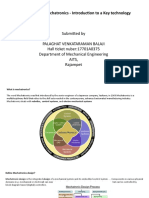Kelmend Dina
Kelmend Dina
Uploaded by
Mend DinaCopyright:
Available Formats
Kelmend Dina
Kelmend Dina
Uploaded by
Mend DinaCopyright
Available Formats
Share this document
Did you find this document useful?
Is this content inappropriate?
Copyright:
Available Formats
Kelmend Dina
Kelmend Dina
Uploaded by
Mend DinaCopyright:
Available Formats
What is Mechatronics?
Mechatronics is a multidisciplinary field that refers to the skill sets needed in the
contemporary, advanced automated manufacturing industry. At the intersection
of mechanics, electronics, and computing, mechatronics specialists create
simpler, smarter systems. Mechatronics is an essential foundation for the
expected growth in automation and manufacturing.
Mechatronics deals with robotics, control systems, and electro-mechanical
systems Do you like mechanics, robotics, or production equipment? Do you have
a knack for creative problem solving? Do you enjoy technical and engineering
activities? Can you work well as a member of a team? Mechatronics could be for
you.
What do mechatronics professionals do?
Mechatronics specialists can do quite a bit across multiple disciplines and have a
solid base from which to grow. Mechatronics specialists know both mechanical
and electrical engineering fundamentals—they speak both languages—so a
mechatronics specialist can work with both mechanical and engineering teams.
Mechatronics specialists work with massive industrial robots, smaller robots in
pick-and-place operations, control systems for bottling or packaging of food and
drink products, drones, designing control systems for rides in amusement parks,
prototype development.
Some mechatronics specialists are employed in firms where it is necessary to
design and maintain automatic equipment. This includes industries such as
manufacturing, mining, aviation, robotics, defense, and transport. Other
mechatronic specialists are employed by large manufacturing companies involved
in high-volume production. Many new career opportunities are on the horizon
due to technological advances.
Mechatronics Disciplines
Mechatronic systems can be found in a wide range of applications, from
manufacturing and robotics to automotive and consumer electronics. Here are
some key aspects of the mechatronics field:
Mechanical Engineering: Mechatronics involves the design and analysis of
mechanical systems, such as sensors, actuators, and mechanical structures. This
can include anything from robotic arms and automated machinery to consumer
products like cameras with auto-focus mechanisms.
Electronics: Electronic components and circuits are used to control and monitor
the mechanical aspects of a system. Sensors collect data from the environment,
and microcontrollers or microprocessors process this data to make decisions and
control actuators. This might involve things like circuit design, PCBs (Printed
Circuit Boards), and electronic components.
Control Systems: Mechatronic systems often rely on control theory to regulate
the behavior of mechanical components. This can involve feedback loops and
control algorithms to ensure precise and desired system performance. Control
engineering is crucial to maintaining stability and optimizing the system's
operation.
Software and Programming: Mechatronics systems often involve software
development to control and coordinate the various components. This can include
writing code for microcontrollers, implementing user interfaces, and integrating
systems with computer networks.
Sensors and Actuators: Sensors gather information about the system's
environment, and actuators take action based on this information. Sensors can
include things like cameras, accelerometers, temperature sensors, and more.
Actuators might be motors, solenoids, or other mechanisms that move,
manipulate, or change the state of the system.
Integration: Mechatronics requires a holistic approach, bringing together experts
from various disciplines to work collaboratively. Engineers in this field need to
understand and bridge the gaps between mechanical, electrical, and software
engineering.
Applications: Mechatronics is applied in a wide range of industries, such as
manufacturing, automotive, aerospace, healthcare, and consumer electronics.
Examples include industrial automation, robotics, automated vehicles, smart
appliances, and more.
Innovation and Automation: Mechatronics has a strong focus on automation and
improving the efficiency and performance of systems. It plays a crucial role in
enabling advancements in industries by developing smarter and more capable
machines and products.
What careers are there in mechatronics?
A degree in mechatronics can lead to management positions, including project
management. Workplaces range from laboratories and processing plants to
engineering design offices.
Mechatronics specialists work in the fields of cybersecurity, telecommunications,
computer science, automotive engineering, robotics, artificial intelligence, and
consumer products and packaging.
Mechatronic specialists may use the following job titles:
• Automotive Engineer
• Control System Engineer
• Data Logging Engineer
• Instrumentation Engineer
• Project Engineer
• Software Engineer
• Systems Engineer
• Service Engineer
Where do mechatronics professionals work?
• Mining, Quarrying, and Oil and Gas Extraction
• Public Administration
• Finance and Insurance
• Manufacturing
• Management of Companies and Enterprises
• Transportation and Warehousing
• Accommodation and Food Services
• Construction
• Health Care and Social Assistance
• Retail Trade
• Arts, Entertainment, and Recreation
• Educational Services
What skills do mechatronics specialists need?
Mechatronic specialists have broad multidisciplinary skills, so they are able to
move into more traditional engineering disciplines.
A mechatronics specialist is a creative problem solver who can work on a team.
Thinking creatively is the first step; being able to communicate good ideas to
coworkers involves tact.
Many mechatronic engineers use computer-aided design (CAD) and other
engineering software for modeling, simulating, and analyzing complex
mechanical, electronic, or other engineering systems.
What tasks do mechatronics specialists do?
There are many tasks mechatronic specialists perform, depending on their
particular industry.
• Some design, develop, maintain, and manage high-technology engineering
systems for the automation of industrial tasks.
• Others apply mechatronic/automated solutions to the transfer of material
components or finished goods, or design and assist with the manufacture
of consumer products such as cameras and video recorders.
• Still others carry out studies into the feasibility, cost implications, and
performance benefits of new mechatronic equipment.
• And others apply electronic and mechanical processes and computers to
tasks where the use of human labor may be dangerous (for example,
underwater exploration, mining, or forestry).
COURSEWORK
SUBJECT : WHAT IS MECHATRONICS
TOBIC : ENGLISH
BRANCH : MECHATRONICS - 1 b
SCHOOL : POLYTECHNIC UNIVERSITY OF TIRANA
WORKED : KELMEND DINA
You might also like
- Xenogears Official Strategy Guide - Text PDFDocument227 pagesXenogears Official Strategy Guide - Text PDFZhong Shi50% (2)
- QST30 GCS ConnectionsDocument5 pagesQST30 GCS ConnectionsOGNo ratings yet
- Writing Academic English, Fourth Edition Answer KeyDocument64 pagesWriting Academic English, Fourth Edition Answer KeyLaman100% (2)
- Chapter 9 Technology Impact On BusinessDocument20 pagesChapter 9 Technology Impact On Businesssanchita22No ratings yet
- Chart Patterns ForexDocument16 pagesChart Patterns Forexnishitsardhara83% (6)
- Mechatronics Engineering EssentialsDocument2 pagesMechatronics Engineering EssentialsAnuj NathaniNo ratings yet
- What Is MechatronicsDocument11 pagesWhat Is MechatronicsKEVIN SNo ratings yet
- Mechatronics DisciplineDocument3 pagesMechatronics Disciplineoearnest02No ratings yet
- Guidelines For Mechatronics EngineeringDocument10 pagesGuidelines For Mechatronics EngineeringPyae HtooNo ratings yet
- What Is MechatronicsDocument4 pagesWhat Is MechatronicscasotiNo ratings yet
- MechatronicsDocument44 pagesMechatronicsTboiNo ratings yet
- Fa17 Bme 057Document8 pagesFa17 Bme 057tayyub qayyumNo ratings yet
- Task and Skill Mechatronics AppliedDocument1 pageTask and Skill Mechatronics AppliedEnrique ImNo ratings yet
- Mechatronics Careers: Overview, Demand, Jobs, Salaries, and Top UniversitiesDocument10 pagesMechatronics Careers: Overview, Demand, Jobs, Salaries, and Top Universities2DONo ratings yet
- MechatronicsDocument4 pagesMechatronicsbeckymwila18No ratings yet
- Unit-5 MechatronicsDocument34 pagesUnit-5 Mechatronicsrudrav3210No ratings yet
- What Is MechatronicsDocument3 pagesWhat Is MechatronicsROGELIO STEBAN MORENO MARINNo ratings yet
- Concept of MEDocument4 pagesConcept of MEDarksky PaulNo ratings yet
- What Is MechatronicsDocument3 pagesWhat Is MechatronicsPrabakaran MuniandyNo ratings yet
- Fmem - Unit VDocument57 pagesFmem - Unit VBodhi SealNo ratings yet
- What Is MechatronicsDocument3 pagesWhat Is MechatronicsOswaldo ReanoNo ratings yet
- Mechatronics: Mechatronics, Also Called Mechatronics Engineering, Is AnDocument5 pagesMechatronics: Mechatronics, Also Called Mechatronics Engineering, Is AnMuhammed NehanNo ratings yet
- MECHATRONICSDocument9 pagesMECHATRONICSSUBRAMANI NANJANNo ratings yet
- What Do Mechatronics Engineers DoDocument1 pageWhat Do Mechatronics Engineers DoEnrique ImNo ratings yet
- Mechatronics 1Document6 pagesMechatronics 1R S PappuNo ratings yet
- Mechatronics Tutorial ChristopherDocument19 pagesMechatronics Tutorial Christopherchristopher pazmiño panchanaNo ratings yet
- Career in Mechatronics: Job HighlightsDocument1 pageCareer in Mechatronics: Job HighlightsRamBabuMeenaNo ratings yet
- Assignment On Mechatronics - Introduction To A Key TechnologyDocument8 pagesAssignment On Mechatronics - Introduction To A Key TechnologybalajiNo ratings yet
- ME 475 Mechatronics: Semester: July 2015Document22 pagesME 475 Mechatronics: Semester: July 2015ফারহান আহমেদ আবীরNo ratings yet
- 259 - Lecturer NotvfvvervrevDocument81 pages259 - Lecturer NotvfvvervrevBijay KumarNo ratings yet
- Unit 01Document10 pagesUnit 01Rushikesh RohamareNo ratings yet
- Mechatronics Engineering in BangladeshDocument3 pagesMechatronics Engineering in BangladeshFazlay Rabby100% (1)
- Mechanical Engineering ProfessionDocument6 pagesMechanical Engineering ProfessionKent Lloyd CeloNo ratings yet
- Mech Eng CeidunsDocument9 pagesMech Eng CeidunsandreNo ratings yet
- Mechatronics: From Wikipedia, The Free EncyclopediaDocument4 pagesMechatronics: From Wikipedia, The Free EncyclopediaAnonymous SNjq7SN5XyNo ratings yet
- 3 Technology and Operations ManagementDocument8 pages3 Technology and Operations ManagementJohn Julius MarquezNo ratings yet
- Polytechnic University of The Valley of MexicoDocument5 pagesPolytechnic University of The Valley of Mexicomarianadiaz1063No ratings yet
- Faculty of Engineering Ain Shams University: MDP: MechatronicsDocument43 pagesFaculty of Engineering Ain Shams University: MDP: MechatronicsRaghulNo ratings yet
- Mechatronics 1Document67 pagesMechatronics 1Syeda HusnaNo ratings yet
- MechatronicsDocument9 pagesMechatronicsVi21qNo ratings yet
- Mechatronics 30-07-2019Document3 pagesMechatronics 30-07-2019Prasanna MedamNo ratings yet
- B.Tech Computer Science & ITDocument10 pagesB.Tech Computer Science & ITAravind JayarajNo ratings yet
- Introduction To MechatronicsDocument50 pagesIntroduction To MechatronicsSanniNo ratings yet
- Mechanical Engineering 1Document5 pagesMechanical Engineering 1Pranav WaghNo ratings yet
- Introduction To Mechatronics SystemDocument8 pagesIntroduction To Mechatronics SystemSomalia WadankeygaNo ratings yet
- The Core Components A Comprehensive Overview of Microcontrollers and Microprocessors 20230921091304wa53Document10 pagesThe Core Components A Comprehensive Overview of Microcontrollers and Microprocessors 20230921091304wa53Zee AmanuelNo ratings yet
- Mechatronics: by Ajay Kumar VermaDocument17 pagesMechatronics: by Ajay Kumar VermaAjay VermaNo ratings yet
- Optics and MechatronicDocument2 pagesOptics and MechatronicRajee_vranNo ratings yet
- What Is Mechatronic EngineeringDocument2 pagesWhat Is Mechatronic Engineeringshavindra789No ratings yet
- Lectura Tecnica Ingles IDocument7 pagesLectura Tecnica Ingles IJesus BravoNo ratings yet
- Introduction To MechatronicsDocument19 pagesIntroduction To Mechatronicsanshjaiswal679No ratings yet
- What Is Mechanical Engineering?Document3 pagesWhat Is Mechanical Engineering?KramnedOdnipacNo ratings yet
- Automation and RoboticsDocument18 pagesAutomation and RoboticsRN Subhash ChandraNo ratings yet
- EIS Whitepaper PLM For Mechatronic Products 10 2009Document11 pagesEIS Whitepaper PLM For Mechatronic Products 10 2009khiladi2No ratings yet
- Eccu 211 Manual T 01Document18 pagesEccu 211 Manual T 01Fanny AleNo ratings yet
- Wah A Liyam WahDocument25 pagesWah A Liyam WahAbderrazzak TaNo ratings yet
- Mechatronics (TH-04)Document90 pagesMechatronics (TH-04)Children AcademyNo ratings yet
- Exam ME01Document2 pagesExam ME01Nica Mariz Dela CruzNo ratings yet
- Fundamentals of MechatronicsDocument3 pagesFundamentals of MechatronicsFELIX ROBERT VALENZUELANo ratings yet
- MechatronicsDocument5 pagesMechatronicsJunayed HasanNo ratings yet
- Control and Instrumentation Engineer-JobDescriptionDocument6 pagesControl and Instrumentation Engineer-JobDescriptions_hassan_167419No ratings yet
- Computer EngrDocument3 pagesComputer Engroyebowale.emmanuelNo ratings yet
- Book Reference: (Tentative) : Mechatronics: An Integrated Approach Author: C.W.De Silva Publisher: CRC PressDocument31 pagesBook Reference: (Tentative) : Mechatronics: An Integrated Approach Author: C.W.De Silva Publisher: CRC PressSourav RoyNo ratings yet
- DW Tech Tip Smart Machine DesignDocument13 pagesDW Tech Tip Smart Machine Designzeynell70No ratings yet
- Smart Camera: Revolutionizing Visual Perception with Computer VisionFrom EverandSmart Camera: Revolutionizing Visual Perception with Computer VisionNo ratings yet
- Software Withdrawal and Support Discontinuance - Select IBMDb2 Part Numbers - IBM DocumentationDocument22 pagesSoftware Withdrawal and Support Discontinuance - Select IBMDb2 Part Numbers - IBM Documentation0212080041No ratings yet
- Feasibility of Oyster Shell As Stain RemoverDocument25 pagesFeasibility of Oyster Shell As Stain RemoverShailah Leilene Arce Briones50% (2)
- Dokument - Pub CBWTF Registration 1326 1711 Flipbook PDFDocument34 pagesDokument - Pub CBWTF Registration 1326 1711 Flipbook PDFKriti KumariNo ratings yet
- Jeditor4,+Stackhouse+Et+Al ,+ (2022)Document11 pagesJeditor4,+Stackhouse+Et+Al ,+ (2022)Dominic PolancosNo ratings yet
- Chapter 1 MalikDocument15 pagesChapter 1 MalikPutra Makmur BoangmanaluNo ratings yet
- Span Drive Install ManualDocument19 pagesSpan Drive Install ManualChanpory RithNo ratings yet
- Teaching Grammar To Young LearnersDocument9 pagesTeaching Grammar To Young LearnersDado DodoNo ratings yet
- Dairy Bull - 551BS01410 - TWinkle-Hill Sblamborghini - TMDocument1 pageDairy Bull - 551BS01410 - TWinkle-Hill Sblamborghini - TMJonasNo ratings yet
- Lampiran 3 SpssDocument25 pagesLampiran 3 SpssyulianaNo ratings yet
- Analysis of The Factors Affecting Customer PrefereDocument14 pagesAnalysis of The Factors Affecting Customer Prefere20uco648No ratings yet
- 1-Stereotype 2-Violence 3 - Feminism 4-Self-Confidence 5 - Emancipation 6-Polygamy 7 - Gender 8 - International Women's DayDocument10 pages1-Stereotype 2-Violence 3 - Feminism 4-Self-Confidence 5 - Emancipation 6-Polygamy 7 - Gender 8 - International Women's DaySimo JinyøurNo ratings yet
- Alstrom Series ASTEG Steam Generator BrochureDocument2 pagesAlstrom Series ASTEG Steam Generator BrochureAnonymous 7xHNgoKE6eNo ratings yet
- CHEM 430 NMR Spectroscopy Chapter 6Document77 pagesCHEM 430 NMR Spectroscopy Chapter 6Triana FebriantiNo ratings yet
- t6d Denison Vane Pumps IndustrialDocument5 pagest6d Denison Vane Pumps Industrialisrael ruiz gallardoNo ratings yet
- Room Rates HrasDocument3 pagesRoom Rates HrasRhonna Aromin NavarroNo ratings yet
- Vocabulary Confusing Verbs - English ESL Video LessonDocument1 pageVocabulary Confusing Verbs - English ESL Video LessonSochanvatey HeanhNo ratings yet
- Madison County NotesDocument5 pagesMadison County NotesMike BrownNo ratings yet
- Noli Me TangereDocument4 pagesNoli Me TangereGrace Cañones-TandasNo ratings yet
- Physical Education and Health (H.O.P.E. 4) : Quarter 3 - Module 1Document24 pagesPhysical Education and Health (H.O.P.E. 4) : Quarter 3 - Module 1Vanessa SorianoNo ratings yet
- Lo Shu Grid Numerology Calculator - Chinese Magic SquareDocument7 pagesLo Shu Grid Numerology Calculator - Chinese Magic SquarenightclownNo ratings yet
- 20MnCr5 Chromium-Manganese Case Hardening Steel - Hillfoot Multi MetalsDocument1 page20MnCr5 Chromium-Manganese Case Hardening Steel - Hillfoot Multi MetalsAnonymous 1iojHt3No ratings yet
- Good Woodworking February 2018Document92 pagesGood Woodworking February 2018kaka_02468100% (3)
- Kahn 1986Document28 pagesKahn 1986an100% (1)
- Anesthesia in OrthopedicsDocument5 pagesAnesthesia in Orthopedicsvieirafs73No ratings yet
- Intro Script AhmDocument2 pagesIntro Script Ahmjames domingoNo ratings yet

























































































